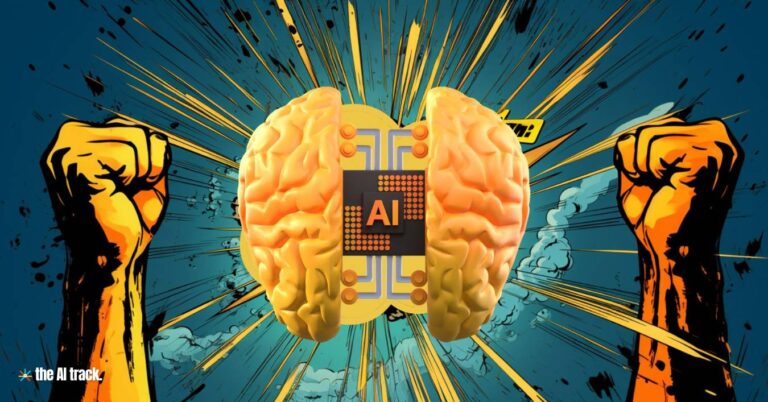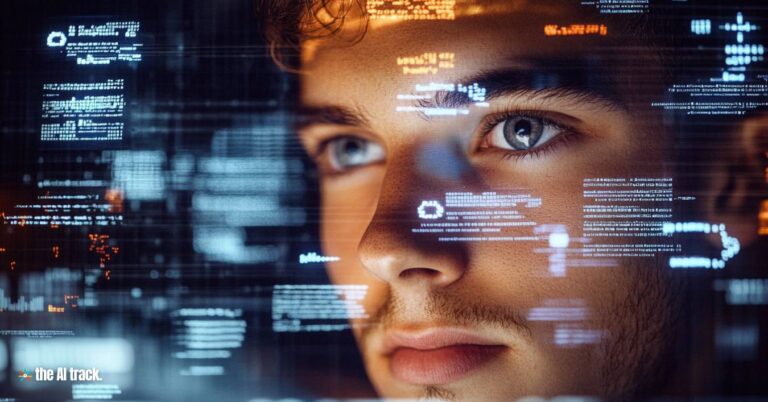The 2024 Paris Olympics are set to be a landmark event not only for sports but also for the integration of AI technologies. These advancements aim to enhance athlete performance, improve spectator experiences, and bolster security measures, albeit with significant challenges and concerns regarding privacy and civil liberties.
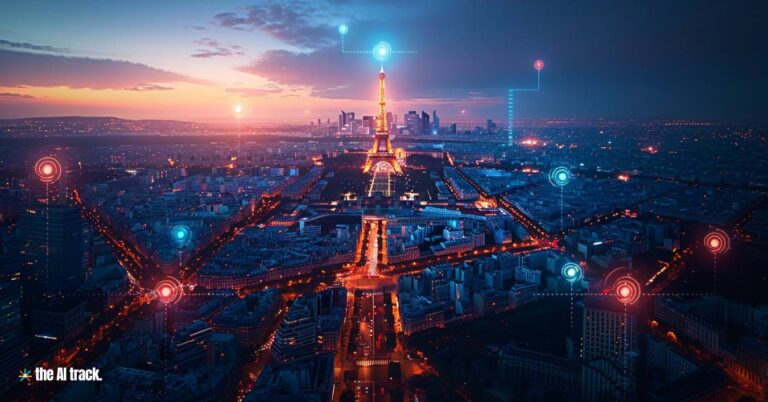
AI in the 2024 Paris Olympics: Key Points
Athlete Performance and Training
AI technologies, such as Intel’s 3DAT, will play a crucial role in optimizing athlete training. These systems provide biomechanical insights, allowing for the development of custom-designed gear and personalized nutrition plans. This tailored approach aims to enhance performance by analyzing athletes’ movements and physiological data to identify areas for improvement.
Advanced swimsuits with water-repellent coatings and repairable composites for pole vaults illustrate how technology enhances athletic performance. ‘Super spikes’ in running shoes are another example, improving speed and demonstrating the significant influence of technology on competition outcomes. These advancements show the continuous evolution of sports equipment, driven by cutting-edge technological innovations.
Furthermore, AI technology will be employed to monitor social media platforms to safeguard athletes from abusive content. This system will flag inappropriate messages, allowing timely interventions and ensuring a safer online environment for participants.
Refereeing and Real-time Data
AI is also being tested for refereeing, using real-time data analysis to improve decision-making accuracy. However, its adoption varies across sports due to challenges like data collection and funding. This trial represents a significant step towards enhancing fairness and precision in sports officiating.
An AI-assisted judging system for gymnastics will be introduced in the 2024 Olympics. This system uses lidar and high-definition cameras to create 3D models of gymnasts, helping judges accurately calculate difficulty scores and ensuring fairer outcomes. AI assists in calculating the difficulty of routines, providing a second opinion and supporting human judges in making precise decisions.
Omega Timing uses computer vision to analyze swimmers’ movements in real-time and smart bibs worn by track-and-field athletes send thousands of data points per second to high-speed computers. Superfast cameras, shooting at 40k frames per second, help determine winners in close finishes.
Athlete Chatbot
AthleteGPT, an AI-powered chatbot, will be available through the Athlete365 app to assist athletes with real-time information and support throughout the games. This tool provides a convenient and reliable resource for athletes to get immediate answers to their questions.
AI for Discovering Athletes
The International Olympic Committee (IOC) is utilizing AI to identify potential Olympic athletes. A notable initiative in Senegal employs 3D Athlete Tracking (3DAT) technology to analyze the physical movements of young athletes, identifying over 40 children with Olympic potential. This advanced scouting method showcases AI’s capability in talent identification and development.
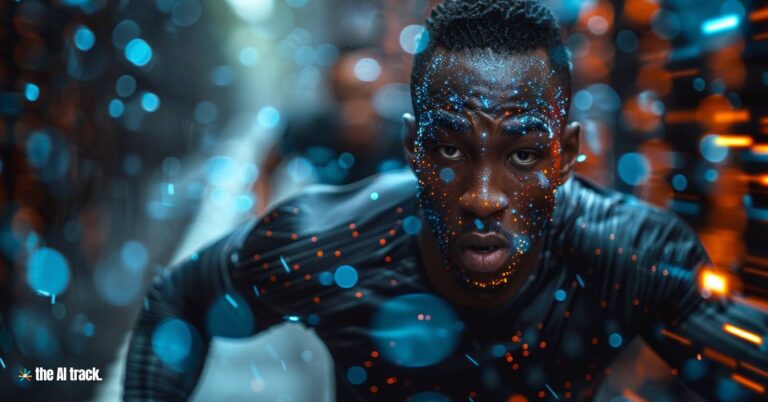
Viewer Experience
Broadcasters are leveraging AI to enhance viewer experience by providing personalized highlights and detailed event statistics, such as acceleration, top speeds, and stride lengths.
AI-driven multi-camera replays and 3D modeling will revolutionize how events are broadcasted. These innovations will offer viewers comprehensive views and enriched storytelling, bringing them closer to the action than ever before.
Google, as the official AI sponsor for Team USA, is integrating advanced AI technologies into Olympic broadcasts. This includes features like Google Maps’ 3D views of iconic venues, AI Overviews for instant information delivery, and immersive experiences using Google Lens and Google Maps Immersive View. These innovations aim to enhance viewer engagement and provide a more interactive and informative viewing experience.
“Google’s ‘Dear Sydney’ ad, which showcases the Gemini AI chatbot generating a letter for a young fan to her sports idol, has sparked significant backlash. Critics argue that it undermines human creativity and authentic expression, highlighting a broader concern about AI’s encroachment into traditionally human domains. This controversy underscores the need for a balanced approach in integrating AI into personal and creative aspects of life.
AI Surveillance
One of the most controversial applications of AI at the Olympics will be its use in surveillance. AI algorithms are set to monitor CCTV footage across 46 transport stations in Paris to detect potential threats, such as crowd surges and abandoned objects. This extensive surveillance has raised significant privacy concerns, with critics arguing that it could infringe on civil liberties and lead to discriminatory practices.
Government Justification
French Interior Minister Gérald Darmanin has defended these measures, labeling them essential for ensuring security during what he describes as the “biggest security challenge” in peacetime. The government’s approach has been to enhance safety through advanced technologies, which they argue is necessary given the scale of the event and the associated risks.
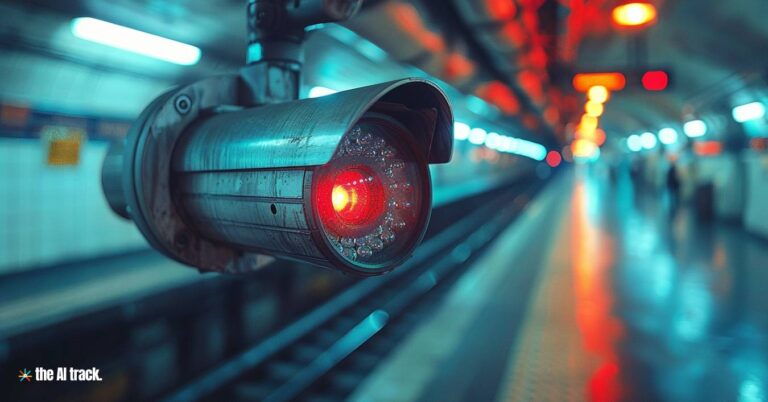
Privacy Concerns
Critics have voiced strong objections to the AI surveillance plans, warning that they may violate privacy rights and set a dangerous precedent for future events. Concerns have been raised about the long-term implications of such technologies, particularly regarding the potential normalization of mass surveillance.
Technological and Ethical Debate
Companies involved in the surveillance, such as Wintics, assert that their technologies are privacy-friendly by avoiding facial recognition. However, privacy advocates argue that any form of image analysis can involve biometric data, which raises ethical questions about consent and data usage. The lack of transparency regarding how data will be collected, analyzed, and stored adds to the apprehension surrounding these technologies.
Why This Matters: The integration of AI into the 2024 Paris Olympics exemplifies its potential to transform sports, from training and performance to officiating and viewer engagement. This evolution highlights the broader implications of AI in enhancing efficiency, fairness, and enjoyment in global sporting events. However, it also raises important questions about privacy and the ethical use of AI surveillance.
Read a comprehensive monthly roundup of the latest AI news!
The AI Track News: In-Depth And Concise
Sources
- AI goes to the Olympics | Fortune, 25/7/2024
- Three ways AI is changing the 2024 Olympics for athletes and fans | Nature, 25/7/2024
- At the Olympics, AI Is Watching You | Wired 25/7/24
The real rising star of the Olympics? Technology | The Hustle 06/8/2024
AI is all over the Paris Olympics, but Google Gemini ad sparks backlash | MarketWatch 29/7/ 2024
- AI and tech innovations at Paris 2024: A game changer in sport | Olympics 20/7/2024
- The Olympic gymnastics word embraces AI | The Verge 29/7/2024



